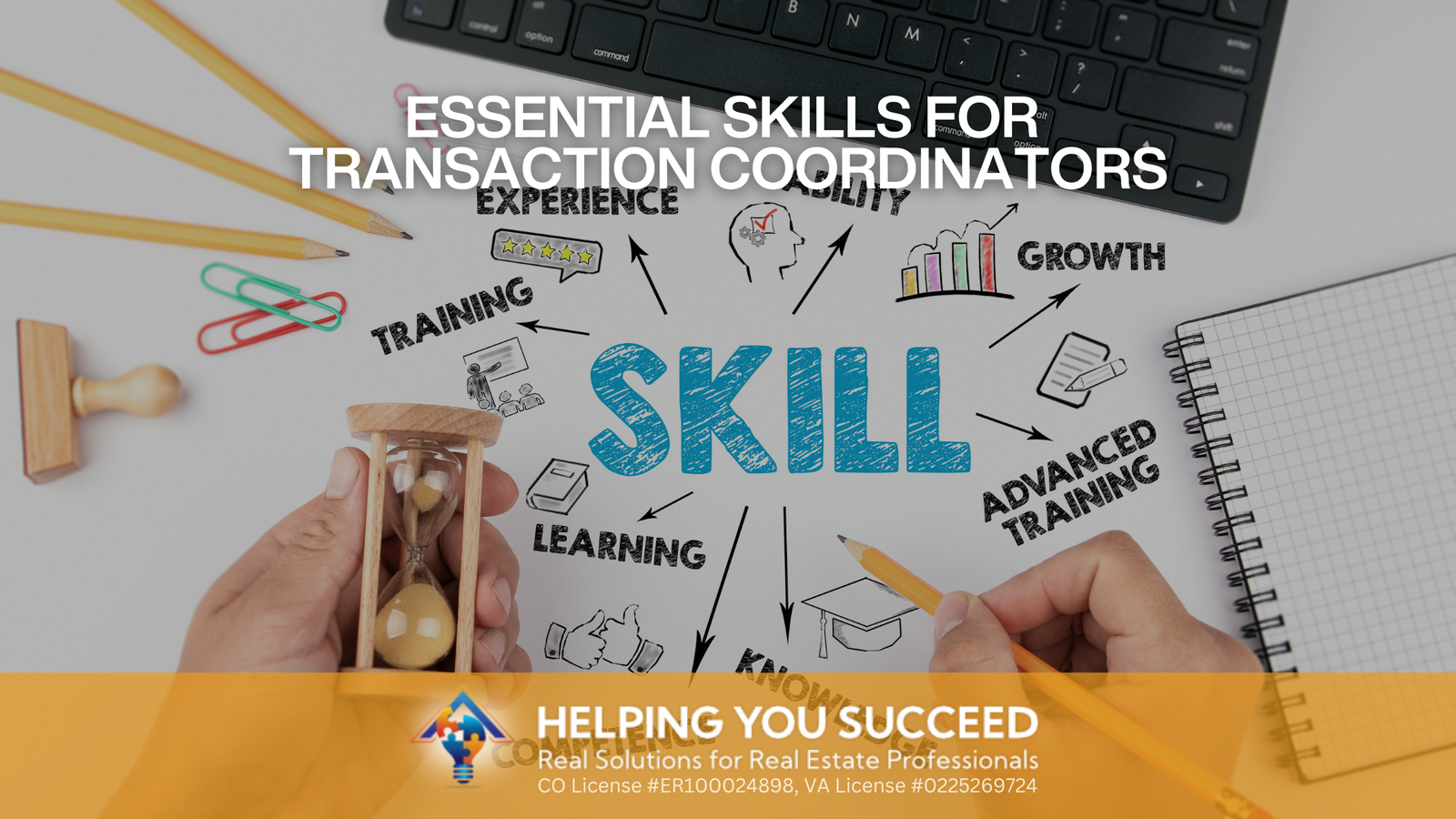Transaction coordinators play a vital role in the real estate world, ensuring everything stays on track from start to finish. They handle a wide range of tasks, from managing documents to communicating with various parties involved in a transaction. To excel in this role, coordinators need a unique blend of skills that help keep deals moving smoothly and efficiently.
Success as a transaction coordinator requires more than just basic knowledge. It’s about mastering certain skills that make day-to-day tasks easier and more manageable. From keeping files organized to using the right technology, these skills are essential for supporting real estate professionals in their operations. Effective transaction coordinators bring order and clarity to the complex process of real estate transactions, making sure nothing falls through the cracks.
Mastering Organizational Skills
Organization is key for transaction coordinators juggling multiple tasks daily. Each real estate deal comes with a stack of documents, deadlines, and communication with various stakeholders. Being organized means transaction coordinators keep everything neat and in check, preventing any missed details or last-minute scrambles.
To effectively manage files and schedules, creating a routine or checklist can be incredibly helpful. A checklist ensures that every task is accounted for and nothing slips through the cracks. For managing documents, using a color-coded system for physical files or a well-structured folder hierarchy for digital files can make retrieval faster and easier. Scheduling tools, like digital calendars, offer reminders and alerts to ensure deadlines aren’t missed.
Several tools can aid in boosting organizational skills. Document management systems help store and categorize files efficiently. Task management software organizes daily to-dos and long-term goals, providing a clear list of priorities. Physical tools, like binders and dividers, keep paper documents neat and accessible. Adopting these practices and tools ensures that transaction coordinators maintain order amidst the complex web of real estate transactions, saving time and reducing stress.
Effective Communication Abilities
Strong communication is vital for transaction coordinators as they serve as the hub connecting clients, agents, and other parties involved in a transaction. Clear and precise communication ensures everyone is on the same page, lowering the risk of misunderstandings that could jeopardize a deal.
Enhancing listening and speaking skills is crucial. Active listening involves paying full attention to the speaker, understanding their message, and responding thoughtfully. Practicing this in conversations helps build trust and clarifies expectations. Developing speaking skills involves knowing when and how to communicate messages effectively, whether it’s in person, on the phone, or through video calls.
When it comes to writing emails and documents, clarity and brevity are essential. Emails should be direct, including all necessary details without overloading the reader. Bullet points can help organize information, making it easier to digest. Proofreading is crucial to catching errors or unclear phrases, ensuring that the message is both professional and understandable. By refining these communication skills, transaction coordinators can bridge gaps between parties seamlessly, leading to smoother and more successful transactions.
Proficiency in Technology and Tools
Transaction coordinators rely heavily on technology to manage the complexities of real estate deals. Essential software and tools provide the framework for efficient transactions, saving time and reducing errors. Document management systems like DocuSign simplify signing processes, while transaction platforms streamline the coordination of tasks and deadlines.
Technology plays a crucial role in making processes smoother. Automated reminders keep deadlines in check, and cloud-based storage ensures that important files are accessible from anywhere. Communication apps connect coordinators with clients and agents instantly, improving response times and service quality.
Choosing the right tools involves understanding specific needs and researching available options. Look for user-friendly software with outstanding customer support and adaptable features to suit varied transaction types. By staying up-to-date with technological advancements and selecting the right tools, transaction coordinators can enhance their efficiency and better support real estate operations.
Problem-Solving and Adaptability
Quick problem-solving skills are essential for transaction coordinators, as unexpected challenges arise frequently. Whether it’s dealing with a missing document or resolving a schedule conflict, finding solutions quickly keeps transactions on track. Developing a problem-solving mindset involves a combination of resourcefulness and quick decision-making.
Adaptability is equally important in scenarios where changes happen abruptly. For instance, last-minute regulation changes require coordinators to adjust their approaches swiftly. Being flexible means reassessing strategies and being open to alternative methods to ensure transactions proceed smoothly.
To stay calm and flexible in challenging situations, coordinators can practice stress-reduction techniques like deep breathing or time-outs to regroup. Building a network of reliable contacts can provide support when faced with complex issues. By honing these skills, transaction coordinators can navigate through challenges effortlessly, ensuring successful real estate deals.
Conclusion
These essential skills are at the heart of a transaction coordinator’s effectiveness. Mastering organizational techniques, communication abilities, technological proficiency, and problem-solving acumen creates a robust skill set. Coordinators equipped with these abilities contribute significantly to the real estate process, providing top-notch support for all involved parties.
Whether it’s managing paperwork, facilitating communication, or addressing unexpected obstacles, the skills discussed in this article are invaluable. As the real estate industry continues to evolve, transaction coordinators who develop and refine these skills will be well-prepared to meet the future demands of their roles. Embracing these core competencies paves the way for a successful and fulfilling career as a transaction coordinator.
Looking to enhance your skills and make a mark as a transaction coordinator? At Helping You Succeed, we’re here to support you in mastering these essential skills with our tailored transaction management services. Let our transaction coordinator for real estate help you achieve excellence in your real estate career. Contact us today to learn more about how we can empower your success!




